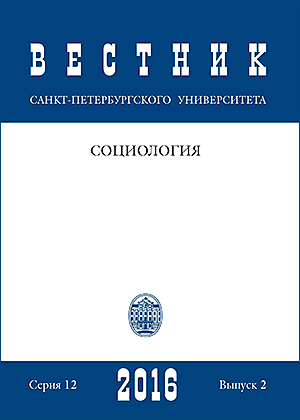THE ATTITUDE OF AMERICAN AND RUSSIAN SOCIETIES TO POVERTY AND THE POOR BY THE EXAMPLE OF FIXED PHRASES, PROVERBS, QUOTES, AND MAXIMS
DOI:
https://doi.org/10.21638/11701/spbu12.2016.207Abstract
The article considers the tolerant and negative attitudes of Russian and American cultures to poverty and the poor. The methodological basis is presented by major works of foreign and Russian scientists in the field of sociology, social stratification and social policy, and various dictionaries. Collections and electronic resources are served as the material for searching fixed phrases, proverbs, quotes, and maxims relating to the concept of “poverty”. We have selected 57 examples and divided them into 2 groups. When analyzing the first group
it has become possible to reveal the similarities in phraseological and speech units of two cultures describing poverty as a separate subculture, where people cannot escape poverty without the help of a society which treats them with tolerance and understanding. A negative attitude towards poverty which is interpreted by two cultures as an abnormal phenomenon in the society is observed by the examples from the second group.
Thus the socio-cultural characteristics of poverty as people’s misfortune, which is neither a vice nor a sin, on the one hand, and poverty as a deviation from the social norms on the other, are sorted and described in this article. Lack of self-reliance, determination and patience does not allow many people to leave the poor community and shift to the “middle class”, thus inequality in the status of cross-sectional groups is continued throughout the history of civilization. Refs 32.
Keywords:
American society, Russian society, poverty, the poor, fixed phrases, maxim, social inequality, stratification
Downloads
References
References
Downloads
Published
How to Cite
Issue
Section
License
Articles of "Vestnik of Saint Petersburg University. Sociology" are open access distributed under the terms of the License Agreement with Saint Petersburg State University, which permits to the authors unrestricted distribution and self-archiving free of charge.




